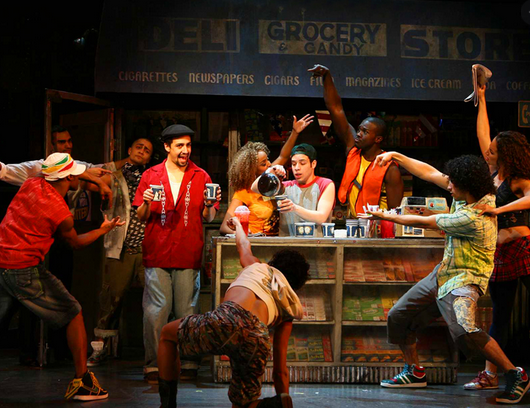A constantly recurring theme as we hopefully start emerging from this pandemic — and even long before it actually happened — was about creating space for new voices and talents, and preferably younger and more diverse voices, whether as writers, directors, producers, designers, actors or even theatre critics.
Of course a constant supply of new talent coming into the industry is its lifeblood — without it, it simply stagnates. As many know, I seriously love musicals — but if we exist on a diet solely of revivals of existing shows, we’ll eventually run out of shows to produce. We need a ready supply of new musicals to challenge the form, and its audiences, with new kinds of expression, and renewing the supply chain of artists who produce it.

Sometimes we don’t see the change coming. When In the Heights arrived in New York in 2007 (pictured above), at a small off-Broadway theatre that was then called 37 Arts Theater (and is now the Baryshiknov Arts Centre, on 37th Street between Ninth and Tenth avenues), I saw it and enjoyed it — but didn’t anticipate that its young composer Lin-Manuel Miranda would go on to revolutionise the form with his next show, Hamilton (also premiered off-Broadway, this time at the Public Theatre, in 2015).
But listening to it again now — as I’ve just done, ahead of the release of a new film version in June — it is clear that the genius of Hamilton could have been anticipated, as it was already keenly on display in the verbal and musical dexterity of In the Heights. And now, of course, Hamilton’s influences are being felt in shows like Six (while Hamilton itself pays homage to musicals of the past, with references to shows from South Pacific and The Pirates of Penzance to The Last 5 Years, as you can read here).
In the last few years, we’ve seen an increasing diversity amongst some of those voices, from Miranda (who was born in New York City but is of Puerto Rican descent) to Stew’s 2006 show Passing Strange (that got to Broadway in 2008) and Michael R. Jackson’s A Strange Loop (produced at Off-Broadway’s Playwrights Horizons in 2019).
This is not exactly a take-over of Broadway’s primarily white voices, but it’s a start. Change is happening. Likewise on the playwrighting front, Broadway has seen Danai Gurira’s Eclipsed land there in 2016 after a run at the Public first), while in 2019 Tarell Alvin McCraney’s Choir Boy had a Tony nominated Broadway run, and Jeremy O’Harris’s Slave Play transferred from New York Theatre Workshop to a Broadway run that has recently received a record 12 Tony nominations (though the winners are yet to be announced).

The front-of-house has also already gone up at the Golden Theatre for the arrival of Keenan Scott II’s Thoughts of a Colored Man when theatres re-open — in this video, the playwright (pictured above, outside the theatre) speaks of the honour — and surprise — of getting there:
“Being a native New Yorker, being from Queen’s, Broadway still feels a world away — its unfathomable. Coming from the neighbourhood I come from, you don’t think about making it to Broadway, to be here in this moment I know I represent a large community that will feel represented now… You can’t go anywhere higher as a writer than Broadway, It’s truly an honour to be here.”
So Broadway is being re-generated, with a new generation, one play at a time. In a column for The Stage published yesterday, designer Grace Smart wrote of the pathways available for new talent to emerge in Britain:
“Starting out in theatre, you have to work your way up venues. You might win an award and pass go, collect £200 on your way round, or pick up a Lyn-Gardner-likes-your-work card from the community chest. But most of the time you’re just slogging away, playing the game.”
She mourns the closure of Trafalgar 2, a studio space adjoining the downstairs bar of what used to be the Trafalgar Studios, which used to provide a West End showcase for emerging companies (who could afford to pay the commercial rent, that is); and also of the National Theatre’s temporary intervention to have a studio showcase during the refurbishment of the Cottesloe before it re-emerged as the Dorfman:
“In 2016, the National’s Shed space closed. My rudimentary understanding of that decision was that this was to encourage the weird and wonderful left-field work into the main building. The sentiment of which is spot-on, but sadly it played out more like tearing down your teenager’s uber-cool video-game filled attic to encourage them to have dinner with the family around the dining-room table.”
She goes on to argue:
“The closure of stepping-stone spaces means it will be harder for newer players to differentiate good jobs from bad jobs, snakes from ladders.
The only people and institutions who can truly help – whether that means missing a go, teaming up, or flipping the board completely – are those who already have a monopoly on the industry.”
But does that stepping aside and letting others have a go stretch to critics, for example? Lyn Gardner involuntarily did so when The Guardian, to much hue and cry, terminated her contract as that paper’s second critic in 2018. And it’s true that doing so did allow in other voices, as a rotating band of critics filled the vacuum (but not the vacancy), including Arifa Akbar (who would herself be appointed to fill Michael Billington’s shoes when he retired, eventually, after 48 years in the post of chief critic, at the end of 2019) and others who were already regular contributors like Mark Lawson and Mark Fisher.
In her case, it was the editor (and inevitably the need for cost-cutting) who decided that Gardner stepped aside. (Though you can’t keep a good critic down, and she’s found other outlets, including in The Stage).
When I myself stepped down from The Stage in March 2019 in different circumstances (that I’ve since described here), after some 17 years of contributing to it regularly, I signed off with a final column in which I quoted Lyn Gardner’s comment on Sarah Frankcom stepping aside from running Manchester’s Royal Exchange to lead LAMDA instead:
“Arts institutions quickly become institutionalised – as do the people who work in them – wanting to carry on doing what they have always done. Frankcom has constantly questioned why we are here, why we are doing what we are doing and what we should be doing differently.”
I quoted that after saying of my own departure from The Stage that “partly, too, it’s also about moving on: commentators can become safe in their berths”. After the quote, I added: “The same may be true for critics and editors.” (Interestingly, when the piece actually ran, the words “and editors” were summarily edited out).
But my problem with Grace Smart’s proposal is who would decide who steps aside to let others have a go, if it’s not editors as happened to Lyn and myself.
It let to an interesting exchange:
So creating space for others is something that each of us can do ourselves. But how many will actually seize that challenge, and be similarly altruistic as Grace has?

